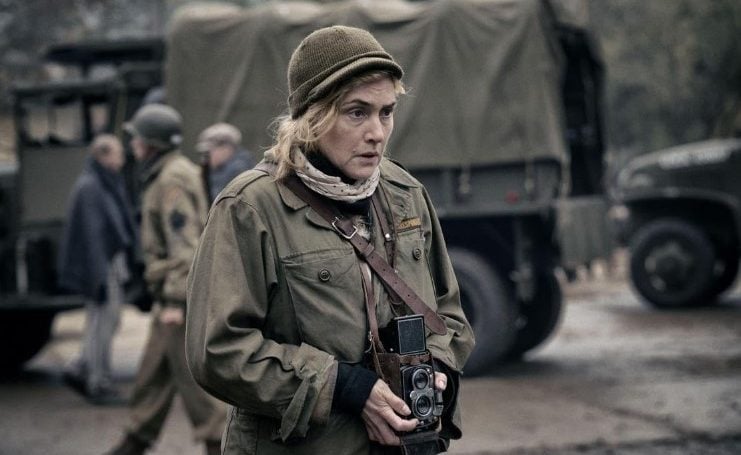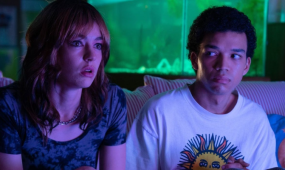Lee
Films & TV
“Winslet’s Oscar-deserving performance anchors the film, making Lee a poignant exploration of a heroic woman whose contributions to both art and history deserve greater recognition,” says Jonathan Sargeant from St Francis College

Lee, steered by award-winning Ellen Kuras in her feature debut as a director, is a biographical drama shining a spotlight on Lee Miller, a woman whose complex legacy as a fashion model, war correspondent and photographer has been overshadowed by history. Starring Kate Winslet in the titular role, the film attempts to unpack Miller’s extraordinary and often contradictory journey, blending war, art and personal trauma. The result is deeply compelling, built around the stellar gifts of Winslet to enable the portrayal of a complicated icon whose story demands to be told.
Focusing on the period of Miller’s life during and after World War II, the film depicts her transformative role as one of the first women war photographers. Her backstory as a glamour model is noted as we are dropped into gatherings with her glamorous friends, including Pablo Picasso, photographer Man Ray and poet Paul Éluard. But this is not that story.
Instead, director Kuras is more interested in Miller’s defiance against societal expectations as a combat photographer. Wisely, too, the film does not shy from painting Miller’s life as a whirlwind of contradictions, both personally and professionally. There is glamour and grit, beauty and brutality. The film’s framing device as an interview conducted later in life serves this purpose well, holding surprises right into the film’s closing moments. Miller was no saint and the hagiographic impulses often at work in other biopics are thankfully avoided here.
Kate Winslet gives a towering performance as Miller, capturing both the outer strength and inner fragility of the character. Winslet is known for her ability to slip into diverse roles. Her turn in 2021’s riveting TV series Mare of Easttown springs to mind as a template for the flawed hero on show here. She embodies Lee’s steely determination, her fierce independence, and the emotional turmoil that stems from her experiences as a woman in an unforgiving era. A marvellous intensity shines as Miller wrestles with the trauma of her wartime experiences and her complicated personal relationships with men, such as renowned artist Roland Penrose (played by Alexander Skarsgård).
Advertisement
One of the most powerful aspects of Lee is its exploration of Miller’s photography. The film pays tribute to her work capturing the horrors of war with an unflinching eye, especially as she documents the liberation of Nazi concentration camps. The scenes in which Miller navigates the ruined chaos of Europe in the closing moments of the war are visceral and gut-wrenching. Kuras is adept at balancing contrasts and there are obvious metaphors at work here between Miller’s character and the scenes she captures. The film offers a glimpse into the way Miller’s artistry emerged from the darkness she witnessed, emphasising her role as both witness and active participant in documenting history.
Whilst some biopics become little more than disjointed show reels of “important” moments, Kuras has provided a laser focus on Miller herself. Some might suggest this leaves other characters less than fully developed. Instead, I rather think the film shows how people like Miller’s work partner Davy Scherman (Andy Samberg in a rare serious role) trailed in the wake of a larger-than-life remarkable woman.
Visually, Lee is a stunning film, capturing the 1940s and 1950s era with rich detail. The production design and costuming enhance the authenticity of the film’s setting without ever feeling like an indulgence. Kuras, a noted cinematographer on films like Eternal Sunshine of the Spotless Mind, uses her eye for framing and complexity to lush effect.
Advertisement
In the end, Lee is a film that pays tribute to an astonishing woman, a photographer who was unafraid to confront the darkest parts of human history through deep investment in her own artistic expression. Winslet’s Oscar-deserving performance anchors the film, making Lee a poignant exploration of a heroic woman whose contributions to both art and history deserve greater recognition.
Lee, Rated M and directed by Ellen Kuras, is currently showing in cinemas.
Editor’s note: Interested in learning more about film, the Arts, and the many intersections with life and faith? Jonathan Sargeant is teaching DA2013Z/DA9013Z God and Contemporary Culture: Theology and the Arts in 2025. Please contact Jonathan Sargeant for more information via jonathan.sargeant@anglicanchurchsq.org.au.






